China-EU Relations: Cooperation Outweighs Differences
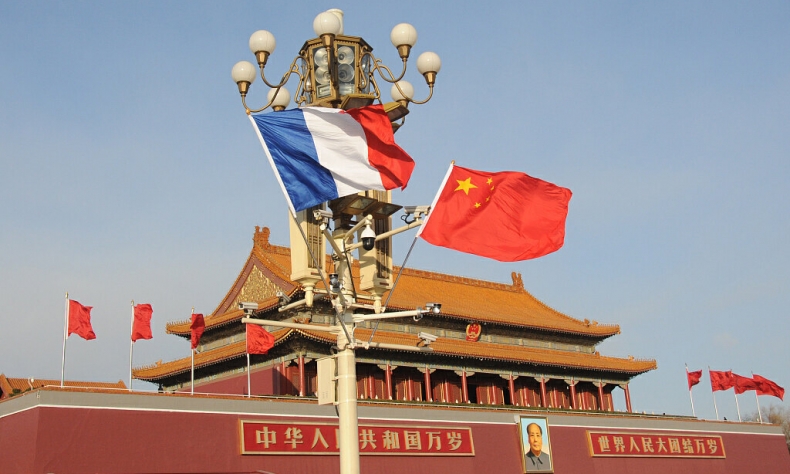
Marking the 20th anniversary of the establishment of their comprehensive strategic partnership, China and Europe have a lot to do in 2023, building up trust and working together to boost global economic recovery and resolve crises.
The past couple of days have seen all eyes in the EU, China, and even the world at large, on China-EU relations. Amid the din of contentious debate on the EU’s strategy about China, French President Emmanuel Macron and European Commission President Ursula von der Leyen made a trip to China from April 5 to 7, sending a clear message that the EU should engage with China rather than decouple from it.
Chinese President Xi Jinping pointed out at a trilateral meeting with Macron and von der Leyen in Beijing on April 6, that cooperation and common ground between the two sides outweigh competition and differences, while noting that China and the EU share extensive common interests.
After German Chancellor Olaf Scholz’s visit to China with a delegation of business leaders last November and the European Council President Charles Michel’s visit a month later, Spanish Prime Minister Pedro Sanchez paid a state visit to China in late March. It is also on the cards that EU High Representative for Foreign Affairs and Security Policy Josep Borrell will come to China too in mid-April. “Political consultations between Chinese and European foreign ministries are held in Beijing almost every week in preparation for frequent high-level interactions between our two sides at the next stage,” China’s Foreign Ministry spokesperson Mao Ning said on April 6. Many business leaders from Europe also attended the China Development Forum 2023 and the Boao Forum for Asia Annual Conference 2023, indicating their confidence in the Chinese market and expectations for more cooperation with their Chinese partners.
Observers believe that all these are signs of warming China-Europe relations. Restarting dialogue mechanisms in various fields, promoting economic and people-to-people exchanges, strengthening cooperation on climate change, and the political settlement of the Ukraine crisis have topped high-level China-EU talks’ agenda.
A crucial relationship at a turning point
For quite a while, the EU has been held hostage by the U.S. in the latter’s geopolitically confrontational attitude towards China on the pretense of so-called security and human rights issues, mostly saliently shown in its suspension of the landmark Comprehensive Agreement on Investment (CAI) trade deal with China, which was inked in 2020. For a region seeking to increase its clout in international affairs, strategic independence is becoming increasingly important.
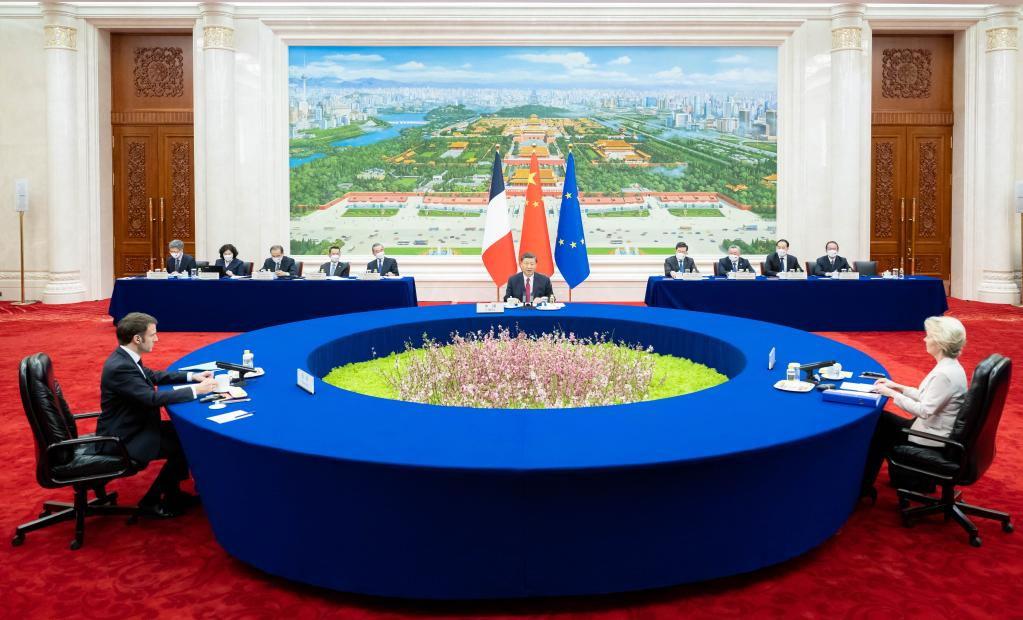
At the recent trilateral meeting, President Xi attached great value to the importance of enhancing the stability of China-EU ties. He pointed out that the China-EU relationship does not target any third party, nor should it be dependent on or dictated by any third party. China has all along viewed the relationship from a strategic and long-term perspective and ensured stability and continuity in its EU policy, he said. China hopes the EU will develop a more independent and objective perception of China and adopt a pragmatic and positive China policy, Xi indicated.
As covered in a recent New York Times article, “In Dealing with China, US and Europe Take Different Tacks,” European leaders are taking different approaches towards China from their American counterparts. Macron and von der Leyen’s visit to China came as the U.S. House Speaker Kevin McCarthy met China’s Taiwan leader Tsai Ing-wen, in her “transit” trip through the United States. This was a clear provocative move, jeopardizing stability across the Taiwan Strait as Taiwan’s Democratic Progressive Party (DPP) authorities have been making a bid to seek foreign support for their “independence” agenda. This also exposed the U.S. intent to “use Taiwan to contain China.”
About the Taiwan question, the European Commission President Ursula von der Leyen indicated at the press conference in Beijing, which the China Today reporter attended, “We all agree that stability in the Taiwan Strait is of paramount importance.”
While meeting reporters in Beijing, von der Leyen also indicated that decoupling from China is not a “viable or desirable strategy” for the EU. “I believe that we have to engage the de-risking,” she said, and pointed out, “there is a large majority of goods and services or trade that is un-risky.”
According to von der Leyen, the EU will soon restart the High-Level Economic and Trade Dialogue and advance steady and balanced growth of economic and trade ties with China for mutual benefit. The EU stands ready to enhance communication and coordination with China to jointly meet global challenges.
Regarding the trip to China, French President Macron enthused on Twitter in French, Chinese, and English, “From Beijing to Guangzhou, I have met students who are learning our language, enthusiastic and dynamic young people, entrepreneurs keen to innovate, and artists inspired by France. There is so much for us to do together. Long live the friendship between China and France!”
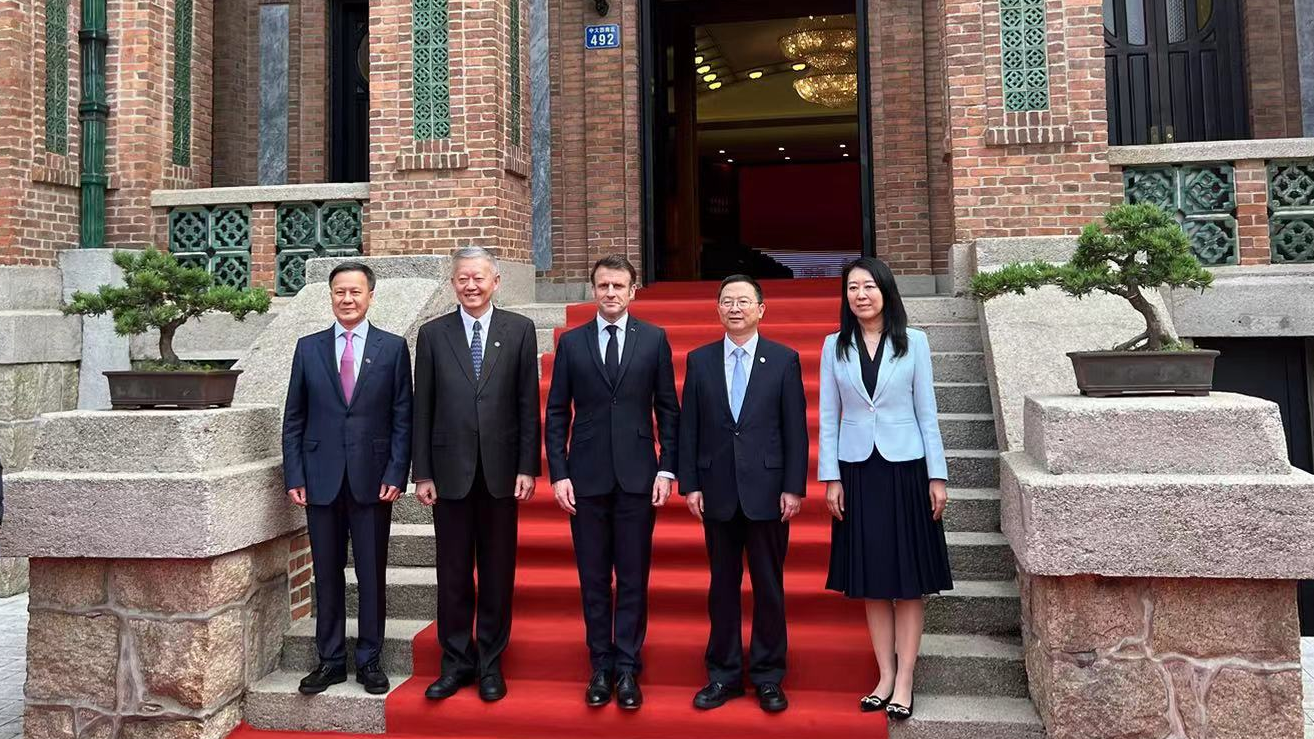
According to a CNN report, a government official of an influential EU member indicated, “Everyone supports Macron’s trip and agrees we need to fix relations with China.” Meanwhile, in a recent New York Times article, Tara Varma, a visiting fellow from France on foreign policy at the Brookings Institution in Washington, was quoted as saying, “There’s a sense there needs to be a clear European position on China that goes beyond the trans-Atlantic relationship and exists on its own merits.”
At the trilateral meeting, French President Macron noted that in a world full of uncertainties, the EU and China need to enhance dialogue and exchange with mutual respect, openness, and humility and keep deepening the EU-China comprehensive strategic partnership.
President Xi stressed that China and EU should seek common ground while shelving differences, and learn to accommodate, appreciate, draw upon, and facilitate each other’s development. Playing up the so-called “democracy vs authoritarianism” narrative and stoking a new Cold War will only bring division and confrontation to the world, Xi pointed out.
Economic cooperation, the cornerstone of China-EU relations
China and the EU are each other’s second largest trading partners. Trade in goods between China and the EU totaled US $847.3 billion in 2022, an increase of 2.4 percent year-on-year. The same year also saw Chinese enterprises’ investment in the EU hit US $7 billion with their investment stock in the region reaching US $102.9 billion.
President Xi noted at the trilateral meeting that China and the EU should keep their markets open to each other, provide a fair and non-discriminatory environment for businesses from the other side, and avoid turning economic and trade matters into political or national security issues. The two sides should build stable and trustworthy supply chains, and synergize the Belt and Road Initiative and the Global Gateway strategy in support of sustained and stable economic growth in China and the EU, he pointed out.
In fact, today the EU region is still in economic doldrums with high inflation and low growth. Strategically, facing the downward pressure on its economy, Europe can’t afford to decouple from China, ignoring its huge consumption market and manufacturing powerhouses.
Talking about China-EU relations, President von der Leyen said at the recent press conference in Beijing, “For both of us, this relationship has a significant impact on our prosperity and our security…If I give you one concrete figure, this means trade of more than €2.3 billion per day.”
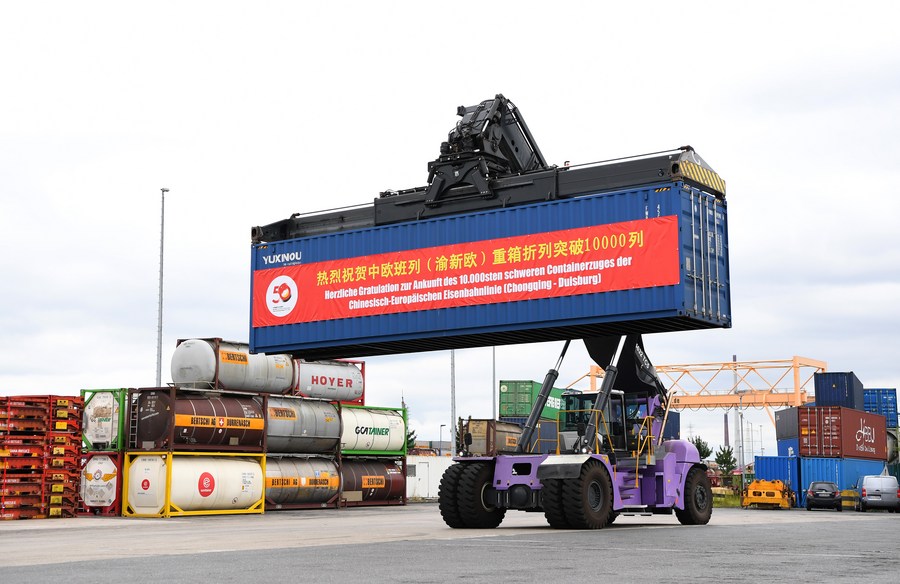
The calls in both the EU region and China for more economic cooperation are strong. On April 5, the Federation of German Industry (BDI) effectively called for a renegotiation of the stalled EU-China investment deal in a statement. Last December, during his visit to China, the President of the European Council Michel indicated that the EU is willing to work with China to continue to push forward the Comprehensive Agreement on Investment, boost stability and mutual trust on supply chain issues, and deepen cooperation in areas where mutual benefits exist. In talks with Italian Prime Minister Meloni and Spanish Prime Minister Sanchez, Chinese President Xi Jinping also committed that China will increase imports of high-quality products from Italy and Spain.
In a recent CNN report about EU-China relations, a European diplomat was quoted as saying, “If we are to achieve our long-term goals. …Our geopolitical value is nothing if our economy is struggling.”
At the trilateral meeting, French President Macron noted that the EU and China should work with each other to stay away from the trap of economic decoupling and severing supply chains and carry out mutually-beneficial cooperation on an equal footing.
Data show that the trade volume between China and France has increased from US $60 billion to US $80 billion in the past five years. According to China’s Ministry of Commerce, 18 agreements have been sealed between 36 Chinese and French enterprises at a bilateral business meeting on April 6. The most outstanding one is the shipbuilding deal inked between the world’s largest shipbuilder, China State Shipbuilding Corp (CSSC), and French shipping giant CMA CGM, involving the building of 16 dual-fuel ultra-large container ships, totaling more than RMB 21 billion. This has set the record for a single order by value that Chinese shipbuilders have ever received.
Pushing for the political settlement of the Ukraine crisis
Since its outbreak, fanned by the United States, the Ukraine crisis has become a global geopolitical issue, even being leveraged by some Western countries in sizing up their relations with China. President Xi stressed that China’s position on the Ukraine issue is consistent and clear. It is essentially about facilitating peace talks and political settlement.
As regards the Ukraine crisis, Xi noted that its cause is complex and a prolonged crisis serves no one’s interests. He said a ceasefire as soon as possible would serve the interests of all parties concerned, and a political settlement is the only correct solution.
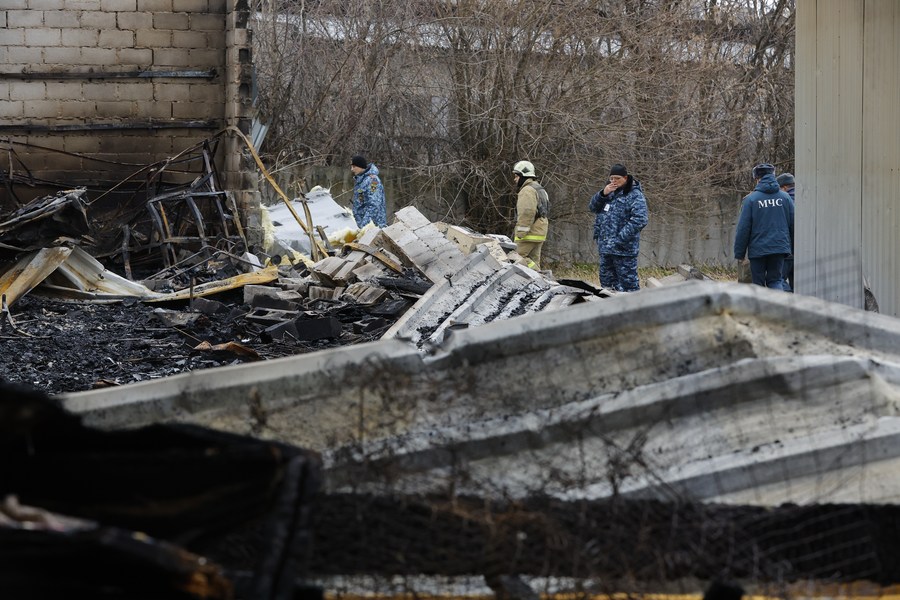
As a region bearing the brunt of the Ukraine crisis – afflicted by high inflation, an energy crisis, and the increasing influx of refugees – the EU has no reason to fuel the crisis as the United States does now. Thus, realizing a political settlement of the crisis has become a consensus among Chinese and EU leaders.
While meeting the press in Beijing, von der Leyen indicated that she welcomed some of the principles that had been put forward by China about the political settlement of the Ukraine crisis. “This is notably the case on the issue of nuclear safety and risk reduction, [as well as] China’s statement on the unacceptability of nuclear threats or the use of nuclear weapons.” she said.
China will never handle the Ukraine issue out of selfish interests, but always stands for fairness and justice. All relevant parties should shoulder their responsibilities and make joint efforts to create conditions for a political settlement, Xi observed at an informal meeting with French President Emmanuel Macron in Guangzhou on April 7.
Macron said France also believes that a political settlement of the Ukraine crisis needs to take into account legitimate concerns of all parties. He also added that France attaches great importance to China’s international influence and is willing to work closely with China to facilitate an early political settlement of the crisis.
Marking the 20th anniversary of the establishment of their comprehensive strategic partnership, China and Europe – two major global forces and two big markets – have a lot to do in 2023, building up trust and working together to boost global economic recovery and resolve crises.
 Facebook
Facebook
 Twitter
Twitter
 Linkedin
Linkedin
 Google +
Google +










